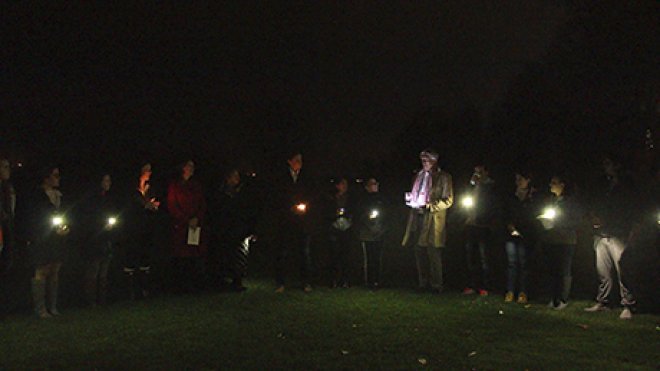Students Shine a Light on Syrian Civil War
A course examining human behavior through the lens of the Syrian conflict inspires students to raise awareness on campus

BRISTOL, R.I. – As civil war in Syria continues to devastate the country and displace millions of people, a group of Roger Williams University students led a grassroots-effort to make sure it’s not forgotten beyond the walls of a classroom. Inspired by an examination of the human impact of the Syrian conflict in a fall semester CORE Human Behavior course, the students decided to take what they had learned to the greater campus community with a candlelight vigil to spotlight the struggles that Syrian refugees are experiencing worldwide.
As twilight descended over campus on Nov. 15, students and faculty joined the class outdoors, some with candles and others shining cell phone lights, to reflect in solemn silence and to hear about the conflict from a variety of perspectives.
“Here at Roger Williams, sometimes we struggle,” said Anas Alfeez, a sophomore criminal justice major from Saudi Arabia who spoke fondly about Syria as a beautiful place he visited in his childhood. “But our struggles are good ones. We struggle to become educated, to do well on tests, to pursue our interests. Syrians struggle to survive.”
This kind of open and honest dialogue was exactly what Professor Alan Canestrari had hoped to jumpstart by bringing timely social justice issues into the classroom. In previous years, he’s taught the Human Behavior course around general psychological and sociological theories, but has since altered his approach to use current events and contemporary issues as a way for students to internalize the world and their place in it. And the University’s “Quest for Refuge” series – a yearlong series of events and academic programming that reflect critically on the current state of refugees around the world – allowed his classroom to be a springboard for exploring human compassion, altruism, and more through the lens of Syria’s civil war.
“At some point, I think these ideas have to be brought into the curriculum in an authentic way, otherwise we’re just bouncing from one theory to the next without any real connections,” said Canestrari. “You give students opportunities to investigate, and maybe students might try to exercise their political power to influence others.”
In the class students took on projects that investigated an issue related to the refugee crisis – such as altruism across cultures, mental health in refugees, conflict created by cultural clashes and education of children in refugee situations – through the anthropological concepts discussed in class. But they weren’t content with keeping what they had discovered to themselves. They exhibited a true social justice activist spirit when they resolved to go beyond the course curriculum to organize and lead a candlelight vigil on campus.
Sophomores Emma Gengo and Liz Sledge, the students at the helm of the vigil, said that holding the event on campus would be a way to digest the events happening across the globe, share thoughts and perspectives with one another, and raise awareness among the campus community.
“Many of us had no idea of the reality of the situation [in Syria],” said Gengo, an elementary education major. “It was important to have this vigil on our own campus to spotlight what’s happening, but to also put things in perspective.”
Candles flickered and cellphone flashlights beamed that November night as attendees listened thoughtfully to speakers’ views and experiences, and reflected during the silences. The gathering concluded with a call to continue the spirit of the vigil even after the circle dispersed as more discussions, programs and opportunities for action unfold when the “Quest for Refuge” series continues into the spring semester.
“It is very easy to think that [the war in Syria] isn’t a problem we need to worry about,” said Alex Murphy, a senior international relations major and business minor who is president of the student club Roger for Refugees. “But it is our duty as humans to get in touch with our humanity, to think about what it would be like to experience this kind of struggle.”